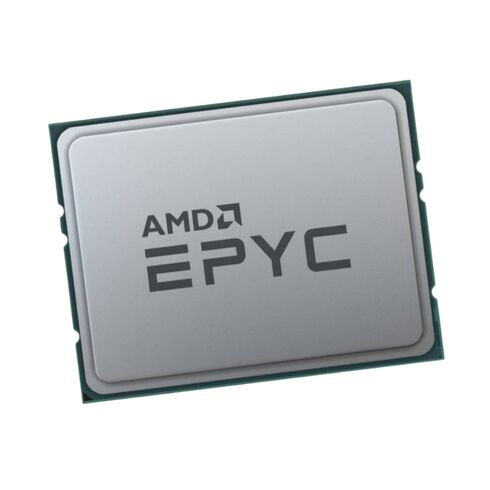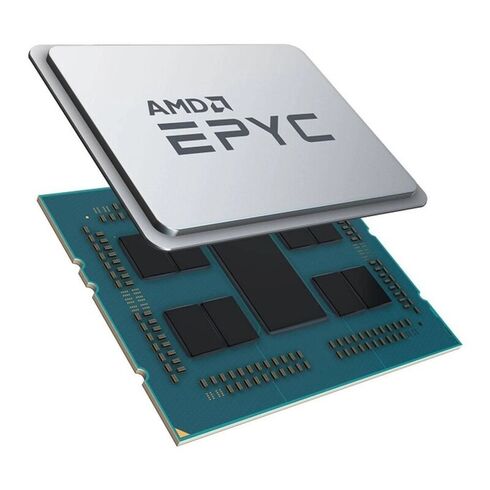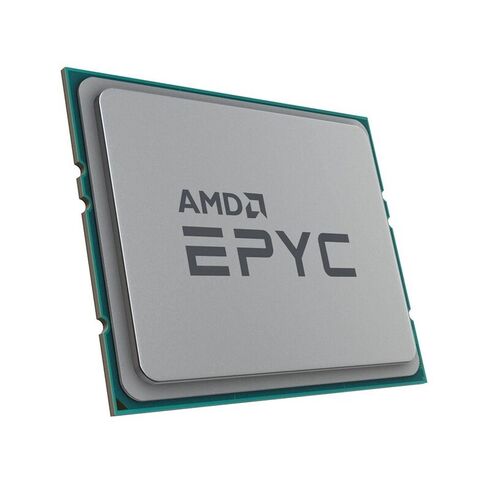PS7251BFV8SAF AMD EPYC 7251 8-Core 2.10GHz Socket SP3 Processor
- — Free Ground Shipping
- — Min. 6-month Replacement Warranty
- — Genuine/Authentic Products
- — Easy Return and Exchange
- — Different Payment Methods
- — Best Price
- — We Guarantee Price Matching
- — Tax-Exempt Facilities
- — 24/7 Live Chat, Phone Support
- — Visa, MasterCard, Discover, and Amex
- — JCB, Diners Club, UnionPay
- — PayPal, ACH/Bank Transfer (11% Off)
- — Apple Pay, Amazon Pay, Google Pay
- — Buy Now, Pay Later - Affirm, Afterpay
- — GOV/EDU/Institutions PO's Accepted
- — Invoices
- — Deliver Anywhere
- — Express Delivery in the USA and Worldwide
- — Ship to -APO -FPO
- — For USA - Free Ground Shipping
- — Worldwide - from $30
Overview of the Epyc 7251 Processor
Product Details
- Manufacturer: Advanced Micro Devices Inc
- Part Number: PS7251BFV8SAF
- Type: Server Processor
- Model: Epyc 7251
Technical Specifications
Core and Performance
- Number of Cores: 8-core
- Base Clock Speed: 2.1 GHz
- Maximum Boost Clock: Up to 2.9 GHz
Cache and Thermal Design
- L3 Cache Size: 32 MB
- Maximum Thermal Design Power (TDP): 120W
- Compatible Socket: SP3
Key Features
Efficiency and Performance
- Advanced 8-core architecture for robust multitasking.
- Base clock speed of 2.1 GHz, with the ability to boost up to 2.9 GHz for enhanced performance.
- 32 MB L3 cache ensuring fast access to frequently used data.
- 120W TDP for optimal thermal management and energy efficiency.
Compatibility
- Designed for servers using the SP3 socket for seamless integration.
- Ideal for high-demand computing environments requiring reliable processing power.
Core Count
The AMD EPYC 7251 Processor is equipped with an impressive core count of 8. This feature plays a crucial role in determining the processing power and performance of the CPU. In this section, we will delve into the benefits and importance of having 8 cores in a processor.
Enhanced Multitasking
With 8 cores, the AMD EPYC 7251 Processor enables efficient multitasking capabilities. Each core can handle multiple threads simultaneously, allowing for seamless execution of multiple tasks at once. This is particularly advantageous for users who engage in resource-intensive activities such as video editing, 3D rendering, or running virtual machines. The increased number of cores ensures that these tasks can be distributed evenly, resulting in faster and more efficient processing.
Improved Performance
The core count directly affects the overall performance of a processor. More cores mean that the CPU can handle more instructions simultaneously, resulting in faster execution times. This is especially beneficial for applications that are designed to utilize multiple cores, such as gaming or high-performance computing tasks. Users can experience smoother gameplay, reduced lag, and increased overall system responsiveness.
Parallel Processing
Having 8 cores enables parallel processing, which is crucial for optimizing performance in applications that can efficiently utilize multiple threads. Parallel processing allows for the simultaneous execution of different parts of a program, resulting in faster completion times. Computationally intensive tasks, such as scientific simulations or data analysis, can greatly benefit from this feature. Users can expect significant time savings when performing complex calculations or running simulations.
Server Workloads
The AMD EPYC 7251 Processor with its 8-core count is also an ideal choice for server workloads. Servers often handle a multitude of tasks simultaneously, including hosting websites, running databases, and managing network traffic. The increased core count allows for better load balancing and improved resource allocation across different applications, ensuring optimal performance and responsiveness. With 8 cores, the processor can efficiently handle the demands of a server environment, resulting in enhanced productivity and user satisfaction.
Base Clock Speed
The base clock speed of the AMD EPYC 7251 Processor is set at 2.10GHz. This feature is an essential factor in determining the overall performance and responsiveness of a CPU. In this section, we will explore the benefits and importance of the base clock speed.
Basic Operations
The base clock speed represents the frequency at which the processor operates under normal conditions. It determines how quickly the CPU can execute basic instructions and perform everyday tasks. A higher base clock speed means that the processor can handle these tasks more efficiently, resulting in a smoother and more responsive user experience. Whether you're browsing the web, checking emails, or performing simple office tasks, a higher base clock speed ensures snappy performance.
Single-Threaded Applications
Certain applications rely heavily on single-threaded performance, meaning they can only utilize a single core for execution. In such cases, the base clock speed becomes crucial in determining the overall performance of these applications. A higher base clock speed ensures faster execution times for these single-threaded tasks, resulting in improved responsiveness and reduced latency. This is particularly important for applications such as video editing software or CAD programs, where real-time performance is essential.
Gaming Performance
For gamers, the base clock speed plays a vital role in determining the gaming performance of their system. While some games can utilize multiple cores effectively, many still rely heavily on single-threaded performance. In gaming scenarios where high frame rates and quick response times are desired, a higher base clock speed becomes crucial. It ensures smoother gameplay, reduced input lag, and faster loading times. Gamers can enjoy a more immersive and enjoyable gaming experience with the AMD EPYC 7251 Processor's 2.10GHz base clock speed.
Overclocking Potential
The base clock speed also impacts the overclocking potential of a processor. Overclocking allows users to increase the clock speed beyond the default values, thereby achieving even higher performance levels. A higher base clock speed provides a solid foundation for overclocking enthusiasts, as it allows for greater headroom and potential performance gains. With the AMD EPYC 7251 Processor's 2.10GHz base clock speed, users can explore overclocking options to further enhance their system's capabilities.
Cache Size
The AMD EPYC 7251 Processor boasts a generous 32MB L3 cache size. The cache size is an important factor in determining the processor's overall performance and efficiency. In this section, we will explore the benefits and importance of the cache size in detail.
Faster Data Access
The cache serves as a high-speed memory buffer located closer to the CPU than the main system memory (RAM). A larger cache size allows for more data to be stored and accessed quickly by the processor. This results in reduced latency and faster data retrieval times, leading to overall improved system performance. Whether you're loading applications, accessing frequently used files, or running complex calculations, a larger cache size ensures faster data access and smoother operation.
Improved Instruction Execution
The cache size has a direct impact on instruction execution efficiency. By storing frequently accessed instructions and data in the cache, the processor can quickly retrieve them when needed. This eliminates the need to fetch instructions from the slower system memory, resulting in improved instruction execution times and overall system responsiveness. The 32MB L3 cache size of the AMD EPYC 7251 Processor ensures that critical instructions and data are readily available, minimizing delays and optimizing performance.
Multi-Core Performance
The cache size becomes particularly important when it comes to multi-core performance. With 8 cores, the AMD EPYC 7251 Processor can benefit greatly from a larger cache size. As each core can operate independently, having a larger cache allows for better coordination and data sharing between the cores. This results in reduced core-to-core communication latency and improved overall multi-core performance. Users can experience enhanced multitasking capabilities and smoother execution of multi-threaded applications.
Server Applications
In server environments, the cache size plays a critical role in optimizing performance for various applications. Servers often handle large amounts of data and numerous concurrent requests. The 32MB L3 cache size of the AMD EPYC 7251 Processor ensures that frequently accessed data is readily available, reducing latency and improving response times. This is particularly important for applications such as databases, web servers, and virtualization platforms, where rapid data access is essential for efficient operation.
Socket Type
The AMD EPYC 7251 Processor features the SP3 socket type. The socket type represents the physical interface between the processor and the motherboard. In this section, we will explore the benefits and importance of the SP3 socket type.
Scalability
The SP3 socket type is designed for high-performance computing systems that require scalability and flexibility. It allows for easy integration of the AMD EPYC 7251 Processor into various server configurations, ranging from single-socket to multiple-socket setups. This scalability ensures that users can tailor their system to meet their specific requirements, whether it be for small-scale applications or large enterprise-level deployments. The SP3 socket type provides the necessary foundation for building powerful and versatile server solutions.
Future Upgradability
The SP3 socket type also offers future upgradability options. As technology advances and newer processors become available, users can easily upgrade their system without the need to replace the entire motherboard. This not only provides cost savings but also ensures that the system remains up-to-date with the latest advancements in processing power and features. The SP3 socket type allows users to extend the lifespan of their system and adapt to evolving computing needs.
Memory Support
The SP3 socket type enables support for high-capacity memory configurations. Servers often require large amounts of memory to handle data-intensive applications and workloads. The SP3 socket type ensures compatibility with high-speed DDR4 memory modules, allowing for increased memory capacity and bandwidth. This results in improved overall system performance, as data can be accessed and processed more quickly. Users can benefit from faster application response times and enhanced server performance with the SP3 socket type.
Robust Connectivity
The SP3 socket type provides robust connectivity options for server systems. It supports features such as high-speed PCIe lanes, enabling users to connect various expansion cards, storage devices, and networking peripherals. This allows for seamless integration of additional components, expanding the capabilities of the server system. The SP3 socket type ensures that users have the necessary connectivity options to meet their specific requirements, whether it be for storage expansion, network connectivity, or specialized hardware integration.
Part Number
The AMD EPYC 7251 Processor is identified by its part number - PS7251BFV8SAF. The part number serves as a unique identifier for the processor model and provides important information for users. In this section, we will explore the benefits and importance of the part number.
Model Differentiation
The part number allows users to differentiate between different models within the same processor lineup. AMD EPYC processors come in various models, each offering different specifications and performance levels. By referring to the part number, users can easily identify and select the specific model that best suits their needs. This ensures that users can make informed decisions when purchasing a processor, avoiding any confusion or compatibility issues.
Compatibility Verification
The part number also serves as a compatibility verification tool. Users can cross-reference the part number with their motherboard's compatibility list to ensure that the processor is supported. This is particularly important when upgrading or building a new system, as compatibility between the processor and motherboard is crucial for proper operation. By verifying the part number, users can avoid potential compatibility issues and ensure a smooth installation process.
Documentation and Support
The part number is often used as a reference in documentation and support materials. Users can easily search for specific information, manuals, or drivers related to their processor model by using the part number as a search parameter. This ensures that users have access to comprehensive documentation and support resources that are specific to their processor model. The part number serves as a valuable reference point for troubleshooting, software updates, and accessing additional resources.
Warranty and Service
The part number is also important when it comes to warranty and service-related matters. Manufacturers often require the part number for warranty claims or service requests. By providing the correct part number, users can ensure that their warranty coverage remains valid, and any service requests are processed smoothly. The part number serves as a key identifier when dealing with customer support or service centers, allowing for efficient and accurate assistance.
In conclusion, the AMD EPYC 7251 Processor offers impressive features that cater to various user needs. With its 8-core count, users can benefit from enhanced multitasking capabilities, improved performance, and efficient parallel processing. The 2.10GHz base clock speed ensures faster execution of basic operations, improved single-threaded performance, and optimal gaming experience. The 32MB L3 cache size provides faster data access, improved instruction execution, and enhanced multi-core performance. The SP3 socket type offers scalability, future upgradability, memory support, and robust connectivity options. Finally, the part number serves as a unique identifier, helping users differentiate between models, verify compatibility, access documentation and support resources, and ensure warranty coverage. Overall, the AMD EPYC 7251 Processor delivers a powerful and versatile solution for users seeking high-performance computing capabilities.











